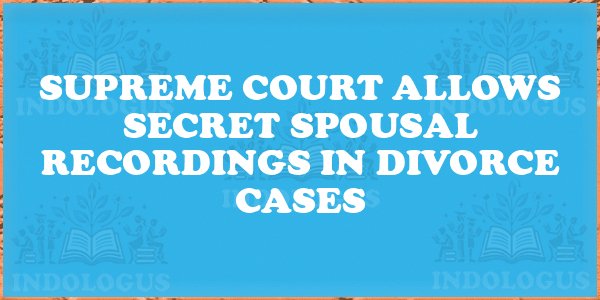The recent ruling by the Supreme Court of India allows secretly recorded conversations between spouses to be used as evidence in divorce cases, overturning a previous Punjab and Haryana High Court decision. This significant judgment reshapes the interpretation of spousal privilege and privacy in Indian legal proceedings.
Understanding Spousal Privilege
- Spousal privilege safeguards private communication between married partners.
- Section 122 of the Evidence Act in India upholds this privilege, protecting marital confidentiality.
- It typically prevents one spouse from being compelled to testify against the other in criminal cases.
Application in Divorce Cases
- Spousal privilege does not directly prevent a spouse from providing evidence in divorce proceedings.
- Evidence such as letters, photos, and third-party testimonies are commonly used to support claims.
- Modern technology has introduced digital evidence like text messages and recordings into matrimonial disputes.
Supreme Court’s Rationale
- The Supreme Court cited a 1973 case where secret recordings were deemed admissible in a corruption trial.
- It extended this precedent to include matrimonial disputes, allowing relevant and verifiable evidence from secret recordings.
- The court balanced the right to privacy with the right to a fair trial, considering secret recordings as akin to third-party witness testimonies.
Impact on Privacy and Marital Trust
- The ruling challenges traditional notions of privacy within marriages.
- While the Evidence Act predates the recognition of privacy as a fundamental right in India, the court clarified that it aims to protect the sanctity of marriage over absolute privacy.
- The judgment emphasizes that admitting secret recordings does not condone surveillance but rather indicates a breakdown in trust within the relationship.
Gender and Technology Access Concerns
- Unequal access to technology, as highlighted by the Mobile Gender Gap Report 2025, raises fairness concerns in legal proceedings.
- With women in India having 39% less smartphone ownership than men, the ruling may inadvertently favor the technologically privileged spouse in recording conversations.
- Addressing digital disparities is crucial to ensure equitable legal outcomes.
Key Takeaways for Competitive Exams
- The Supreme Court’s recent ruling allows secretly recorded conversations between spouses to be admitted as evidence in divorce cases.
- Spousal privilege, while protecting marital communication, does not prevent spouses from providing evidence in divorce proceedings.
- The judgment balances privacy rights with the need for a fair trial, considering secret recordings as legitimate evidence.
- The ruling highlights the importance of addressing digital disparities to ensure fairness in legal contexts.



